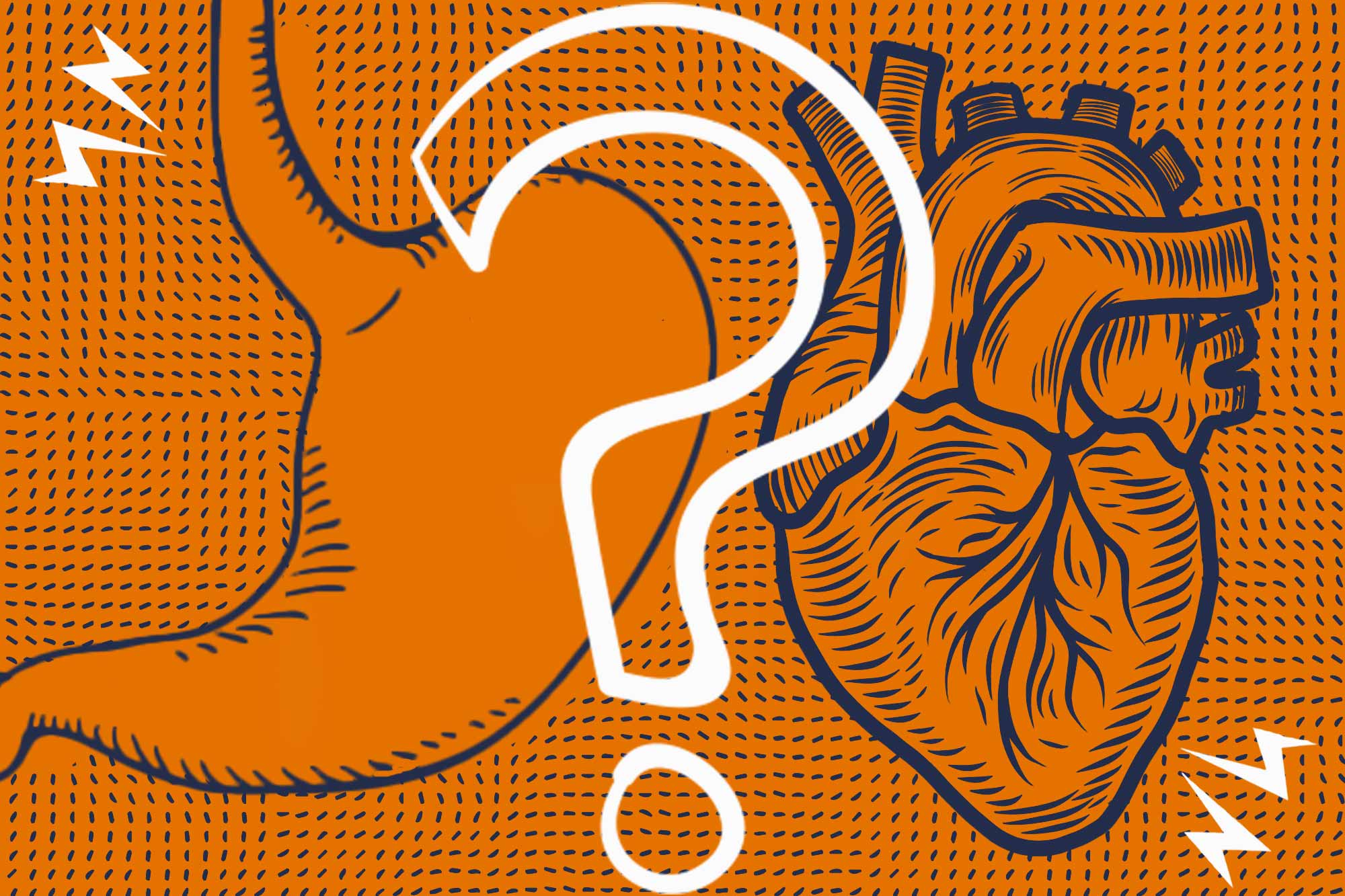Sauer answered UVA Today’s questions about what causes reflux, how to prevent it and what might help differentiate the experience from heart trouble.
Q. Why do we get heartburn?
A. In simplest terms, we get heartburn because the stomach is a very acidic environment naturally, and the esophagus connects to the stomach. Therefore, some stomach contents can move up into the esophagus at times. The esophagus is not able to tolerate such an acidic environment, like the stomach is designed to handle, and this presents as heartburn.
Q. Why do some people suffer worse than others?
A. Heartburn is one of the most common symptoms that people encounter. Some folks experience more heartburn than others due to genetic, anatomical and environmental factors.
For example, anatomical factors that can be associated with more acid reflux include a hiatal hernia, which is often diagnosed during endoscopy.
Other factors that have been associated with increased heartburn include being overweight, smoking and eating late at night.
Interestingly, the other side of the story is that some folks have a lot of acid reflux but have few symptoms of heartburn. This can be a blessing and a curse – the blessing being little or no pain, for example, and the curse being possible significant esophageal damage without knowing it.
Q. What dietary adjustments can be made to prevent it?
A. Some dietary adjustments may help, especially if heartburn is intermittent and mild.
One easy adjustment is to not eat close to bedtime. During our waking hours, gravity often allows any acid reflux into the esophagus to quickly return to the stomach, since we are upright most of the day. However, at night, when lying flat in bed, any reflux can linger for longer in the esophagus.
A way to avoid nighttime acid reflux is to elevate the head of the bed at night, thereby allowing gravity to reduce nighttime acid exposure in the esophagus.
Many folks also experience gastrointestinal symptoms with various foods – some of which may be related to acid reflux, but may also just be related to belching, increased gas production and bloating associated with these foods.
Some foods that have been associated with heartburn include fried food or foods high in fat content (think fast food), potato chips and other processed snacks, fatty meats such as bacon and sausage, tomato-based sauces, wine or alcoholic beverages, chocolate, carbonated beverages, citrus fruits and peppermint.
In general, foods that are higher in fat content stay in the stomach longer and can lead to increased heartburn. Other foods can cause the lower esophageal sphincter to relax more frequently. That can result in higher acid exposure of the esophagus.
The best option is to eat in moderation. Identify foods that give you more issues and avoid those.
Q. Can good posture or exercise help?
A. Good posture and exercise have great health benefits, regardless of whether they help heartburn.
Slouching can alter the anatomy enough to play a role in heartburn. Improvement in posture, especially during and immediately after mealtimes, can reduce heartburn symptoms.
Exercise doesn’t directly reduce acid reflux, and if done immediately after a meal (on a full stomach) can exacerbate heartburn symptoms. Additionally, exercises that force us to “bear down” (think squats, abdominal workouts, etc.) can increase the abdominal pressure and increase reflux, but this is often short-lived.
However, regular exercise often helps us shed a few unwanted pounds, and this will have a significant impact on reducing reflux. Because losing weight often helps with heartburn symptoms, exercise is often suggested as a lifestyle modification for those experiencing heartburn.
Q. Does heartburn affect heart health?
A. Heartburn does not directly affect the health of your heart (cardiovascular health). But it is important to realize that sometimes heart issues can present with chest pain or discomfort that can feel like heartburn (especially in women), so it is important to be evaluated by a health care provider.
Q. What signs differentiate severe heartburn from heart attack?
A. Heartburn and symptoms from a heart attack can be similar. Both present often with chest pain or discomfort. In general, chest pain from a heart attack tends to occur with exertion (exercise, walking upstairs, etc.) and is often described as pressure (i.e., like an elephant sitting on the chest). Heartburn often occurs at times of rest, and sometimes right after we eat, and is more typically described as burning in the chest, sometimes moving upward.
However, many individuals have atypical chest pain associated with heart issues, and therefore, it is best to see a health care provider to rule out any heart-related issues. Because heart-related issues can have severe consequences, your health care provider will assist in evaluating your symptoms.
Q. Anything else readers should know?
A. About 20% of individuals have regular heartburn, and it remains one of the most common reasons why individuals seek medical attention. Besides dietary and lifestyle modifications, there are medical and surgical treatment options that you can discuss with your health care provider. Medical treatments for heartburn are one of the most-taken medications.
Medications that can treat heartburn include antacids containing aluminum, calcium or magnesium (available over the counter), histamine receptor antagonsists (H2RA - famotidine/Pepcid) and proton pump inhibitors.
Among the most-taken class of medications in the United States are proton pump inhibitors, which are potent reducers of acid in the stomach.










